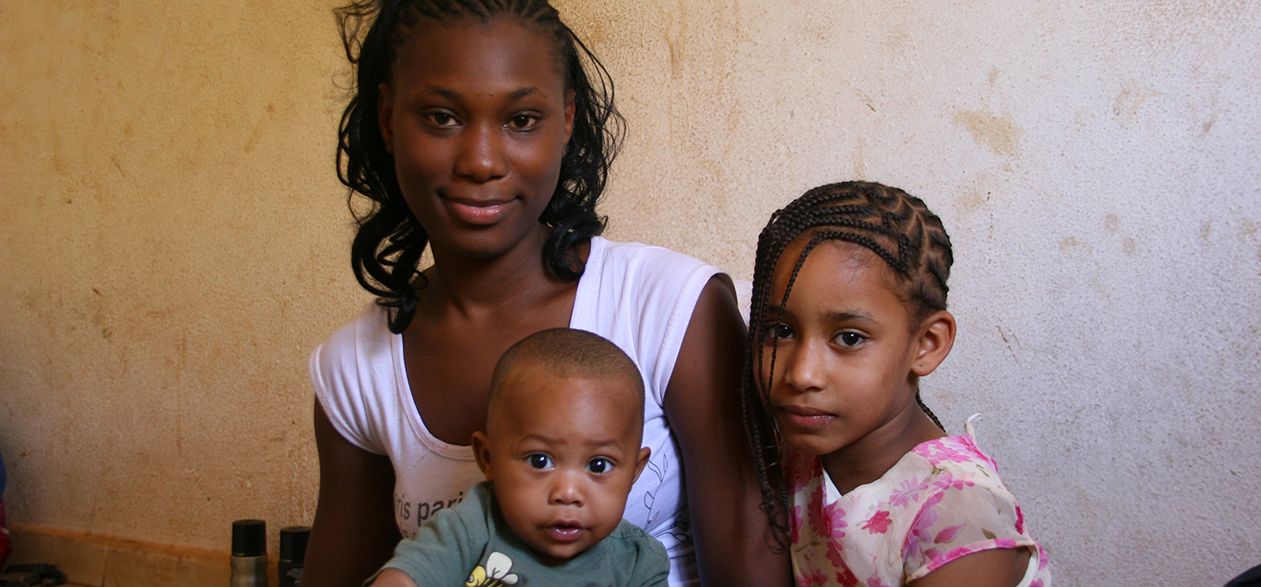
Djélika Haïdara fled Timbuktu while still pregnant with 5 month-old Ousmane. They live in rented rooms in Bamako, Mali with 20 other family members. Photo by Helen Blakesley/CRS
By Helen Blakesley
Djélika Haïdara pushes a plaited braid off her face and hitches her five month-old son higher onto her hip. She leans down to look into the metal pot that’s simmering on the wood stoked stove, placed on the kitchen floor. Cooking has been her main occupation since they left Timbuktu. Since they fled in fear for their lives.
The day the rebels came, Djélika was sitting in the classroom with the other students, as she always did. Listening carefully to the teacher. It was her favorite lesson, physics and chemistry. Then the gunshots started, startling the teenagers sitting in their neat rows behind their desks. The rebels weren’t far away. Their stray bullets were finding innocent victims in the small school building. Some students fainted, others hid, still others were hit—and a number died.
Djélika was pregnant at the time. A newly wed bride carrying her first son. She knew she had to get out. She slipped out of the classroom, skirted the building and ran to the back wall. She managed to pull herself up and over and kept on running.
When Djélika’s mother-in-law heard what had happened, she knew they couldn’t take any chances. Through her tears, she pleaded with her son, Djélika’s husband, Mohamed, to take the family away to safety. Anywhere but here.
Next day, a crowd gathered outside a neighbor’s house. Djélika was walking past. She heard shouts and asked a woman what was going on. “They’re cutting his hand off because they say he’s stolen”.
It was time. The family packed what they could into bags and paid for places in cars that would speed along the desert roads. It took nearly all of their savings. Three days later they arrived in the capital, Bamako.
Djélika looks down into baby Ousmane’s face. Here they are, sharing these rented rooms with twenty other members of the family. One bathroom between them all.
Things are expensive in the capital. Last time she walked to the market, a sack of rice had reached $US 80. It used to be $40.
One thing is helping though. The money the family receives from Catholic Relief Services, a Caritas member based in the USA. It covers the rent. Sometimes there’s enough to go towards some rice or millet to eat. The luxuries, like the colorful bracelets Djélika likes, will have to wait.
The way CRS gives that money helps Djélika feel a little less like she’s sitting there with her hand outstretched. The family receives a pre-paid debit card, so they can choose which ATM machine they use, when they get their cash and how much they take out each time. There’s no standing in line.
Little Ousmane reaches up a tiny hand to pat his mother’s cheek. Djélika misses her studies, misses her old life, but at least the family is together. At least she has her child in her arms.
When all this is over, she’ll go back. When there is peace in Mali, she’ll carry on studying. In her mind’s eye she sees the future. She sees herself, a midwife, bringing more babies into the world. She just hopes it’ll be a peaceful one.
Helen Blakesley is CRS’ regional information officer for West and Central Africa. She is based in Dakar, Senegal. This article first appeared on CRS Emergencies.
